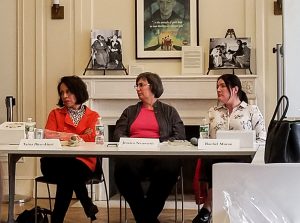
A panel discussion on sex trafficking and the conversation around it drew the largest crowd ever for Roosevelt House’s brown-bag lunch speaker series.
Taina Bien-Aimé, the executive director of the Coalition Against Trafficking in Women and a founding member of Equality Now, and Rachel Moran, a survivor of sex trafficking best known for writing “Paid For: My Journey Through Prostitution,” faced weighty questions from a crowd dominated by young women. The director of Roosevelt House’s Human Rights Program, Jessica Neuwirth, led the discussion.
“I wanted to tell the truth about what I lived and witnessed,” said Moran, who said she was homeless in Ireland at 14 and trafficked for sex by 15, managing to escape the system after seven years. Her accent is strong, and she makes note of it when describing an Irish class system where accents are indicators of wealth, and consequently, made her susceptible to the sex trade.
The brown-bag lunch series and roundtable discussions occur several times throughout the month and provide an opportunity for students to meet with policy makers, government officials and community activists.
Students asked about everything from sugar daddies to pornography to strippers, creating a conversation about the concept of choice. As it turns out, neither Bien-Aimé nor Moran considers the idea of sex work viable. Their voices raised when faced with the question of whether being in the sex-trafficking trade is something that can be a matter of choice, especially an empowering one. She and Moran are insistent about recognizing that the trade is so much bigger than people who enter the trade willingly—as strippers or otherwise.
For her, the suggestion that choice excuses the exploitation that the trade otherwise allows and could even paint the “It’s her fault” narrative about younger victims who don’t have the same choice.
To call anyone a “sex-worker,” they argued, normalizes the profession. To use the word “prostitute” feels offensive. Even the phrase “sex-trafficking industry” normalizes the process as a business. Bien-Aimé said that the right language hasn’t quite been found in English; she likes the passive French prostituée, which translates to “prostituted” and demonstrates that the act of prostitution has been placed upon someone—not done by them.
Bien-Aimé argued that the option to engage in “sex-work” exists for some individuals does not detract from the fact that far more other women and girls are exploited. “You cannot remove exploitation by protecting exploiters,” she said, segueing into the subject of how to legislate change.
She neither agrees with full criminalization nor full decriminalization, as full criminalization puts victims at risk and decriminalization allows exploiters to be protected. Instead she posed, “Decriminalize the supply and criminalize the demand.” She finds hope in that governments are at least trying to grapple with the issue and are beginning to treat it as a network of organized crime.
On a more personal level, Moran asked that students start the conversation.
“We need more people in the general public to get involved,” she urged. “Refuse to allow yourselves to be silenced.”
The brown-bag lunch series and round-table discussions occur monthly, sometimes several times throughout the month, and provide an opportunity to meet with policy makers, government officials, and community activists.
